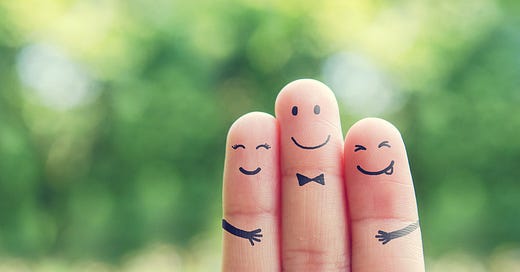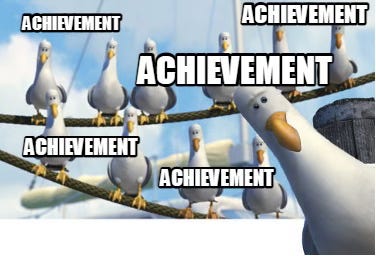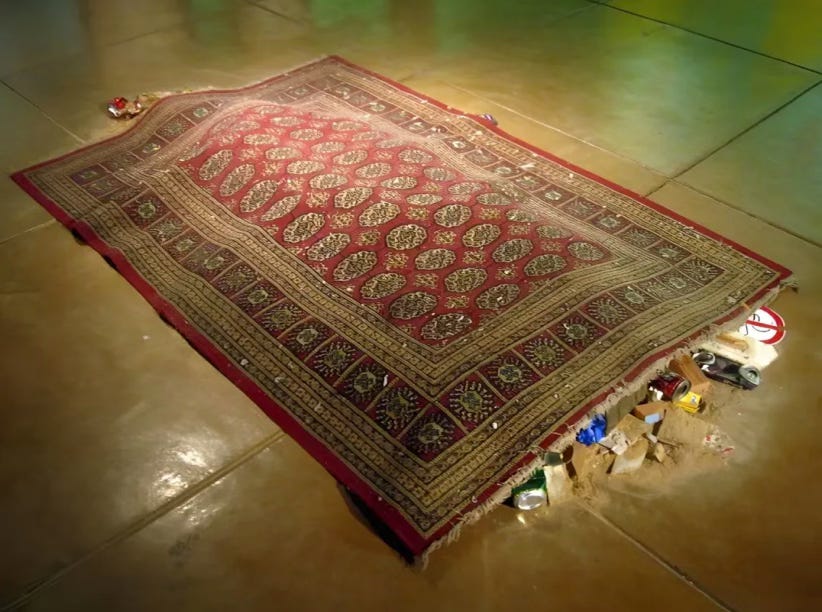The Achievement Paradox: How Accomplishment Backfires (Plus What to Do Instead)
Or, how to keep your to-do list from becoming your personality
Hello, dearest readers,
You know what I’m going to ask: thanks for helping an author out! 🙏🙏🙏
If How to Be Enough resonated with you, made you feel understood, or made you laugh, please drop an honest review on Amazon.
It’s easy: 1️⃣ Click on the blue ratings beside the stars and 2️⃣ Hit “Write a customer review.”
Please don't feel pressured to write a novel! A simple “Helpful!” or a star rating would mean the world. 🤩
Okay, on to today’s newsletter!
Our modern western culture loves achievement. We congratulate each other on work milestones on LinkedIn, love a good glow-up on TikTok, applaud reaching a goal weight on the scale or PR in the gym.
We also applaud a looser definition of “achievement”: we admire the friend who salvages an awkward brunch with a good story, the parent who handles the grocery store toddler tantrum with aplomb, or the proud Facebook post from the friend who somehow had the energy to declutter their kitchen.
Don’t get me wrong: whether your achievements are professional, personal, health-related, appearance-driven, social, familial, or domestic, please keep at it! Setting goals and striving to achieve them confers all sorts of good things from purpose to mastery to fun (okay, Type 2 fun, but still….)
But sometimes our focus on accomplishment can backfire. Here are three lies we’ve absorbed about achievement, plus what to do instead:
Achievement Lie #1: “I have to earn being liked.”
Accomplishment earns us compliments and admiration, which feels good. But being admired is different than being liked.
Put it this way: think about why your friends are your friends. Do you like them because they’re good at soccer, make a lot of money, or got straight A’s in school? In other words, do you like them for their performance? Probably not.
More likely, you like them because of how you feel when you’re together: understood, accepted, and like you can be yourself without having to perform at all. There is an affection and connection that’s fundamentally different from being admired.
The fix:
Rather than thinking you have to earn your way into being liked through good performance, focus on connection: listen, be curious, show up, be interested. But don’t turn this into just another way to perform: you’ll know connection is real when it feels freely chosen and genuine.
Achievement Lie #2: “My value rises and falls with every success or failure.”
It's normal to feel proud when we succeed and bummed when we fail. But when we’re engaging in something called overevaluation, it’s easy to feel like our worth as a person is contingent upon our performance.
And then? Our worth is never a settled question. Every time we raise our hand in class, embark on a new workout routine, or take up meditation (this time it will stick!—really), we’re testing ourselves. Our self-worth depends on whether we meet expectations or fall short, which throws us into an exhausting roller coaster ride of always having to prove ourselves.
The fix:
Focus on the work, not on what it means about you. Take the stance of a chef tasting a dish. What does it need? What would be fun to add? Refine each element to your taste until it’s right.
It’s intuitive that the chef and the dish are different things—take the same stance regarding you and your work.
Achievement Lie #3: No one should see me make a mistake.
Colloquially, Duck Syndrome is when we appear to be gliding effortlessly through life, but are paddling frantically beneath the surface to keep up. Technically, this is called perfectionistic self-presentation.
When we feel pressure to show what’s going well and hide what’s not, making a mistake can feel mortifying.
The fix:
Is the answer to let all your mistakes spill out like a poorly wrapped burrito? Not necessarily.
But do show your mistakes, struggles, and do-overs to the people you want to get closer to emotionally. In a throwback to Lie #1, rather than working to gain acceptance by being impressive, counterintuitively, foster connection by showing some of your mess.
Allowing others to see the metaphorical equivalent of your 3 AM browser history might feel like a giant risk, but it sends two messages: I trust you and we are the same.
Sharing your less-than-flattering side signals your faith that they won’t judge you, and that your relationship is an equal friendship, not a hierarchical teacher-student or mentor-mentee relationship. And guess what? When you share some of your mess, you may get back, Hey, here’s some of my mess, too. In other words, you might create “reciprocal and personalistic disclosure,” or, in less technical terms, the very foundation of friendship.
To sum it all up, please keep setting big goals and chasing accomplishments, but don’t let achievement run the show. Being real is better than any achievement.
Be kind to others and yourself!
PS: You asked, I listened: mostly still images and only minimal motion on any future GIFs! I appreciate your feedback!











So many of us -- we will 😄
Another so so helpful post that makes me both shift uncomfortably in my seat and nod along to enthusiastically. Thank you for shining a light where we generally don't want it and signposting a way out of the dark 💙